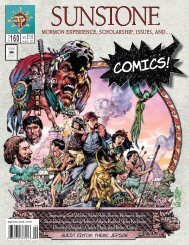is there a place for heavenly mother in mormon theology?
is there a place for heavenly mother in mormon theology?
is there a place for heavenly mother in mormon theology?
You also want an ePaper? Increase the reach of your titles
YUMPU automatically turns print PDFs into web optimized ePapers that Google loves.
S U N S T O N E<br />
they are the m<strong>is</strong>takes of men.<br />
THE RICHNESS OF SCRIPTURE<br />
By Molly McLellan Bennion<br />
BILL RUSSELL’S PAPER CUTS TO THE VERY HEART OF<br />
human dilemma. He asks us to consider how we seek<br />
the truth and how we recognize the truth. We <strong>for</strong><br />
whom religion <strong>is</strong> a help <strong>in</strong> that quest sympathize with Bill’s<br />
concerns.<br />
As one who has taught Gospel Doctr<strong>in</strong>e <strong>for</strong> a total of sixteen<br />
years and other Church classes <strong>for</strong> almost that long, I have seen<br />
how Church manuals and members ignore the difficult scriptural<br />
<strong>is</strong>sues Bill ra<strong>is</strong>es. We ignore them because the scriptures<br />
have too many blatant <strong>in</strong>cons<strong>is</strong>tencies to support the literal<strong>is</strong>m<br />
many Latter-day Sa<strong>in</strong>ts accept <strong>in</strong> theory. We don’t want to expose<br />
the depth of the problem, so we create manuals that are<br />
largely proof texts. Th<strong>is</strong> way, we neither officially endorse literal<strong>is</strong>m<br />
nor challenge its adherents. Our teach<strong>in</strong>g manuals d<strong>is</strong>play<br />
an arrogant d<strong>is</strong>trust of the <strong>in</strong>tellectual abilities and the spiritual<br />
<strong>in</strong>sights of the common person. We do not teach people how to<br />
read the scriptures nor how to deal with troublesome texts. As<br />
Bill correctly concludes, we rarely d<strong>is</strong>cuss <strong>in</strong> Church sett<strong>in</strong>gs<br />
even destructive passages. We also teach occasional falsehoods<br />
as we take scriptures out of context or make explanations based<br />
on guesses when h<strong>is</strong>torical or literary explanations are available.<br />
Given a free hand, how would I teach scriptural study?<br />
Inspired by Bill’s work, I address h<strong>is</strong> warn<strong>in</strong>g labels and add a<br />
few caveats of my own. My response <strong>is</strong> not a critic<strong>is</strong>m but<br />
rather first thoughts towards guidel<strong>in</strong>es I might use to design<br />
scripture study <strong>for</strong> Church classes.<br />
MOLLY McLELLAN BENNION <strong>is</strong> the board chair of<br />
Dialogue: A Journal of Mormon Thought. Th<strong>is</strong><br />
paper <strong>is</strong> drawn from remarks given <strong>in</strong> response to<br />
William Russell’s paper, “Do the Standard Works Need<br />
Warn<strong>in</strong>g Labels?” at the 2003 Salt Lake Sunstone Symposium (tape<br />
SL03–255).<br />
I would teach that the scriptures, though <strong>in</strong>spired by God, are<br />
written by men. God <strong>in</strong>spires men <strong>in</strong> their own languages and<br />
accord<strong>in</strong>g to their understand<strong>in</strong>g and circumstances. “For the<br />
Lord God giveth light unto the understand<strong>in</strong>g; <strong>for</strong> he speaketh<br />
unto men accord<strong>in</strong>g to their language, unto their understand<strong>in</strong>g”<br />
(2 Nephi 31:3). With the exception of personal revelation,<br />
every message we receive from God <strong>is</strong> filtered through<br />
another person. The potential <strong>for</strong> m<strong>is</strong>takes, <strong>for</strong> just be<strong>in</strong>g<br />
wrong, <strong>is</strong> <strong>in</strong>herent <strong>in</strong> us mortals. In particular, the potential <strong>for</strong><br />
our m<strong>is</strong>understand<strong>in</strong>g the context of a scripture orig<strong>in</strong>at<strong>in</strong>g <strong>in</strong><br />
another time and <strong>place</strong> and filtered by another’s understand<strong>in</strong>g<br />
<strong>is</strong> always present.<br />
I would teach that the scriptures are h<strong>is</strong>tories, chronicl<strong>in</strong>g the good<br />
and the bad. To understand them, we must learn as much as we<br />
can of the periods which they describe and <strong>in</strong> which they were<br />
written. I f<strong>in</strong>d the lives of ancient peoples <strong>in</strong>structive regardless<br />
of the merit of their choices or the current irrelevance of their<br />
cultural beliefs and practices. My brothers-<strong>in</strong>-law are no doubt<br />
greatly relieved that should my husband die, I will not climb <strong>in</strong>to<br />
their beds under the foot of the blankets and demand my right to<br />
wed. And I must say that I’m also relieved that my culture doesn’t<br />
put such an expectation on me. But Ruth’s claim upon Boaz and<br />
h<strong>is</strong> reluctance to honor h<strong>is</strong> obligation tell us much of family, of<br />
loyalty, and of societies that undervalue women. The exclusion<br />
of bastards from the community, even up to the tenth generation,<br />
<strong>is</strong> another good example (Deuteronomy 23: 2). Why would a society<br />
have adopted such a rule? What conflicts had they with<br />
other cultures which might have led to th<strong>is</strong>? Were women<br />
viewed as property? Probably yes—so what br<strong>in</strong>gs people to do<br />
that? How was power divided and controlled, and why? Was the<br />
purity of the community so important to its survival that God<br />
could have sanctioned such a law? Or <strong>is</strong> th<strong>is</strong> a case of God giv<strong>in</strong>g<br />
humans agency and stand<strong>in</strong>g by to ra<strong>is</strong>e our sights only when we<br />
demonstrate a read<strong>in</strong>ess to receive?<br />
These stories leave us stew<strong>in</strong>g <strong>in</strong> our juices, contemplat<strong>in</strong>g<br />
what <strong>is</strong> right and what <strong>is</strong> wrong. I f<strong>in</strong>d the stories useful. I regret<br />
that we ignore them because, were we to look <strong>for</strong> a constructive<br />
use <strong>for</strong> these stories, I th<strong>in</strong>k we would often f<strong>in</strong>d one. When we<br />
don’t f<strong>in</strong>d any redeem<strong>in</strong>g value, we can teach that a flaw doesn’t<br />
render the scriptures useless any more than our own flaws<br />
render us useless. To glean <strong>in</strong>spired guidance from the scriptures,<br />
we must read neither too uncritically nor too cynically.<br />
I would teach that scripture writers value the humanity of the<br />
players. Contemporary Mormon writers are much more likely<br />
JULY 2004 PAGE 31
















